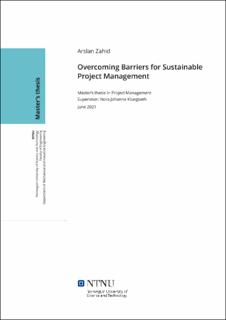| dc.description.abstract | The interest on the sustainability concept has boomed significantly and the organizations worldwide are now trying to incorporate the sustainability principles in their businesses. This has been propelled due to the climate change as a result of greenhouse gas emissions as well as not efficiently utilizing the natural resources; having a negative impact on the environment. However, the implementation of sustainability is still lacking in the organizations and the green movement is still at its infancy, especially in the developing countries.
The purpose of this study was to find the numerous sustainability barriers and how these barriers can be overcome in the form of potential drivers to move towards the sustainable development. A literature review of more than 400 different resource materials was performed and 97 of it were finally selected to be the part of this research study. In addition, a total of 18 interviews were also conducted with professionals working in different organizations to understand their perspective regarding the sustainability barriers. This in turn will help in understanding the identified barriers and subsequent drivers towards realization of the 2030 Agenda for Sustainable Development by United Nations, 2015 and to be an integral part of the European Green Deal, 2019 by European Union.
Various sustainability factors were identified associated with implementation of sustainability in an organization. These sustainability elements in the form of barriers were further simplified and categorized in form of organizational factors, time and financial constraints, lack of knowledge and awareness, stakeholders’ perspective, lack of established standards, frameworks and tools, political and governmental role, and others. Each of these highlighted barriers have their own significance depending on the context of the organization. Likewise, the sustainability drivers were also spotlighted and grouped as organizational aspects, financial factors, promoting awareness, stakeholders’ role, standards and tools, government policies and regulations, and others.
Furthermore, the aftermaths of incorporating the sustainable activities on the organizations’ financial resources were also emphasized. The economic benefits include profitability and higher internal rate of return, reduced costs and wastes, energy savings, and improved productivity of the built environment. Nonetheless, implementing sustainability principles is not like a piece of cake for every organization. Sustainability has to make the economic sense. If the profits or positive return on investments are not generated in time, then there is a risk of going bankrupt or out of the businesses for firms as they simply cannot cope with the losses for long time. Companies especially small and medium sized firms are unable to withstand the cost strains of sustainability incorporation in the long-term.
Finally, the role of project management was also emphasized towards accelerating the process of sustainable development. A lifecycle perspective, a holistic approach is needed to attain the sustainable development goals by the United Nations successfully and playing an important part towards making the Europe the first climate-neutral continent in the world; zero emissions of greenhouse gases by 2050. | |
